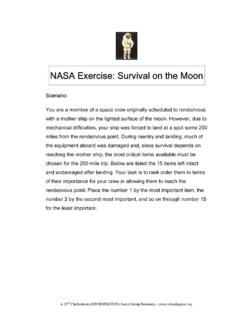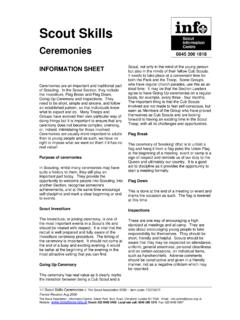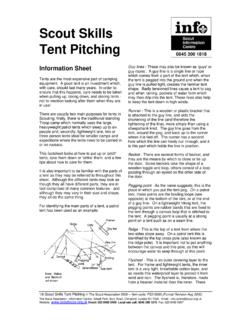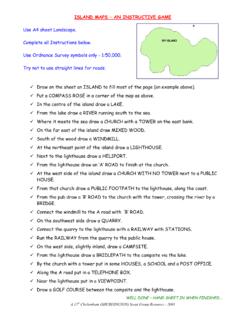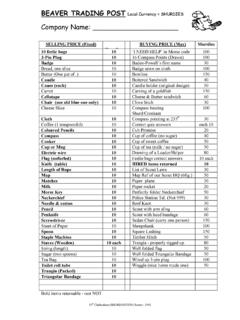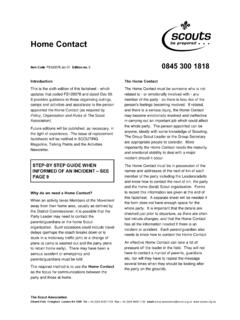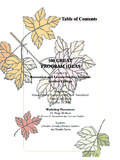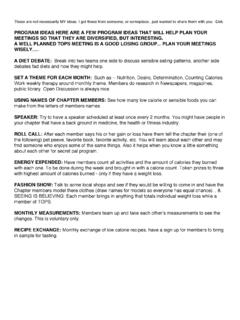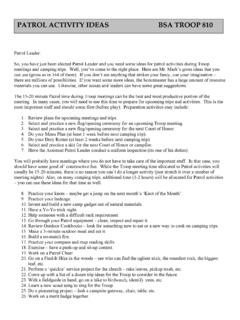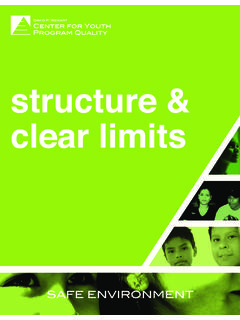Transcription of Programme Ideas for Scouts of all ages
1 Programme Ideas Always check the activities you run abide by The scout Association s Policy, Organisation and Rules. Page 1 Adventure The call of the wild is so clear and strong for so many young people that we must make every provision to create opportunities for our members to experience adventure. Land adventures Abseiling; Bouldering; Caving; Fell running; Ice climbing; Mountain biking; Mountaineering; Orienteering; Pony trekking; Rock Climbing; Search and Rescue exercises; Hill Walking; Snow activities; High level camping; Water adventures Bird watching; Boardsailing; Bridge building; Canoe building; Canoeing; Fishing; Gorge and gulley trails; Ice skating; Raft construction and rafting; Rowing; Coracle building; Rubber rafting; Sailing; Swimming; Night adventures Night hikes; Star trails; Wide games; Backwoods cooking; Night navigation; Bivouacking; Wild life spotting; Orienteering; Low-level adventures Archery; Backpacking; Cycling; Farming; Forestry; Horse riding; Obstacle courses; Pioneering; Camping; Survival hikes; Tracking; Environmental projects Ocean Adventures Coastal hikes.
2 Fishing; Island survival; Life saving; Sailing; Dolphin and whale spotting; Diving; Snorkelling; Beach combing; Bird watching Air Activities Name the starting place of an aircraft and state the direction and speed of flight, and give the time spent in the air. So who is the first to plot the landing place on the map? Make a kite Make model planes - Air fix or balsa models Visit a nearby airfield or harbour and work out the compass course of aircraft and shipping. Obtain a book on making paper planes and get Patrols to make different designs. Have a landing contest, longest flight contest. Best flyer etc. Make plastic parachutes and use them to experiment as to the best size to float different weights to the ground Ask a pilot to visit the Troop and demonstrate how a plane is navigated from airport to airport Borrow a computer and bring down to den.
3 Arrange to have a flight simulator Programme available for Patrols to try. Visit an airport Arrange an air symbol and aircraft shape quiz. Learn about air traffic control signalling and radio procedure. Visit an air traffic control centre. Have a Frisbee throwing competition. Construct a model rocket and launch it in open ground after permissions have been obtained. Give each Patrol a number of sheets of thick aero board and ask them to sculpt a piece of art. Make boomerangs and learn how to throw them. Make hovercrafts using aero board and card and an elastic band powered propeller. How an Inter Patrol races once trails have been completed by Patrols. Lay a model aircraft or small boat on a map. Each scout in turn works out the compass bearing of the model from a given direction. Darken the room.
4 The light of a moving torch flashing on the ceiling represents an aircraft. Each scout in turn calls out its compass direction. Patrols are given the where with all to make a kite. First Patrol to make and fly their kite is the winner Programme Ideas Always check the activities you run abide by The scout Association s Policy, Organisation and Rules. Page 2 Creative Arts Arrange the members of the Patrols so that by using a strong light a profile shadow can be cast onto a piece of paper placed on a wall. Create shadow profiles of each member of the Troop. Get each Patrol to explore the art of batik - designs are created on cloth using wax, which are then dyed in coloured dyes. When ironed the wax is removed from the cloth. Get the Patrol to explore tie-dyeing. Make a unique design for Patrol T-shirts etc.
5 Arrange an Inter-Patrol photography Competition with a Patrol camera as a prize. Borrow a number of video cameras and challenge Patrols to make a horror film. Try blow painting with a straw and some paint. Put on a Scouting display. Patrols are requested to build display stands and decorate them. Invite parents, teachers and young people to display Prepare and perform a one act play Give each Patrol 5 minutes to select a place not too far from your den that they know how to get to. The Patrol must then present a mime of their mystery tour . This might include getting on buses, crossing at traffic lights, cycling etc. Other patrols have to guess where they are going. Provide Patrols with a number of dyes and allow Patrols to experiment with tie dying. Each patrol are given photocopies of a number of magic tricks and are given a set time say 15 minutes to perfect the trick or tricks.
6 Hold a magic contest later. Provide each Patrol with a desk lamp, some large sheets of paper and a pencil or felt tipped pen. Each scout is shadowed on a sheet of paper and the outline of his head drawn out while he remains still. Cut out each outline and challenge the other Patrols to identify each other Make a small screen printing press and have Patrols print their own neckerchiefs or T-shirts for camp. Create a real mess! Patrols are given large pieces of paper and poster paints and invited to create finger paintings. Create mobiles from driftwood or other items found while hiking or camping. Invite a photographer to your meeting and learn how to take and develop your own photographs Using an old toothbrush and some paint create splatter prints of leaves and other objects which can be used later for Kim's Games Patrols create a collage on a selected subject using pictures etc.
7 From old magazines and newspapers. Create a Patrol or Troop newsletter. Set it up using a desktop publishing package and print it on Unit duplicator or with assistance of local printer, who may also let up do the work under direction. Make potato prints by carving a design on sliced potatoes. Use poster paints or fabric paints to print designs on paper or fabric. Obtain samples of calligraphy writing and have Patrols create an opening page for their Patrol logs. Using the technique of paper machine create masks for the members of each Patrol. Paper strips are placed on mould and using Poly bond layers are built up to create mask or other objects. With the assistance of a drama teacher or mime artist Patrols should create a short mime act. Patrols are given short plays and have 30 mins. To learn their lines and perform the play for the Troop.
8 Obtain a book about face painting and give each Patrol a small face painting kit. The Patrol must face paint each other. Perhaps as the animal the Patrol is named after. Good activity for Halloween Party. Make a horror video. Patrols must create all effects and make the monster as well as direct the filming. Video camera can be borrowed from parents. Patrols make a number of puppets and put on a play for the rest of the Troop. Using only your hands and body parts create shadowgraphs - shadow puppets and put on a short play for the Troop. Using paper and charcoal sticks or crayons create a number of 'brass rubbings' in your local graveyard or old church. Or as an alternative you could 'brass rub' tree barks or manhole covers. Create a number of pottery pieces using the coil or slab method and fire using a camp kiln or as potter to show you how to made pottery on a wheel.
9 Macnas, the Galway Art Group, create weird and wonderful costumes for their parades. Set the Patrols the task of creating costumes for a space age parade or other weird event. Visit an art gallery. Create a wide game/treasure hunt relating to the detail in each of the paintings. Make a viewfinder for use when drawing panoramas. Obtain a piece of strong card and make a viewing slot 200mmX 100mm. Divide this opening into a grid with thin string or wire. Look through the viewing slit when using it. Programme Ideas Always check the activities you run abide by The scout Association s Policy, Organisation and Rules. Page 3 Astronomy Borrow a telescope, and try stargazing on a clear night. Carry out a night hike, finding the way by the stars. Try making a star chart to hang up in the den. It could also show the various constellations, comets and moon phases.
10 Sky Gazing - all lie on your backs. How many different things can you see without moving your head ( clouds, birds, planes, trees) One of the most vivid memories you can create in the minds of Scouts is to spend a night out under the stars. A groundsheet on the ground and a warm sleeping bag, plus the talk of stars and planets not to mention spaceships and ET life on other planets. You will nearly always end up talking about the wonder of the Universe and the place of God in its creation Make Star charts to enable your Scouts to quickly identify the constellations while out and about watching the skies. Make a moon compass, which can be used to determine direction when travelling at night. Visit an observatory or planetarium Challenge your Patrols with the NASA exercise that requires the patrol to choose from twenty items, which are available on their crashed space ship.
